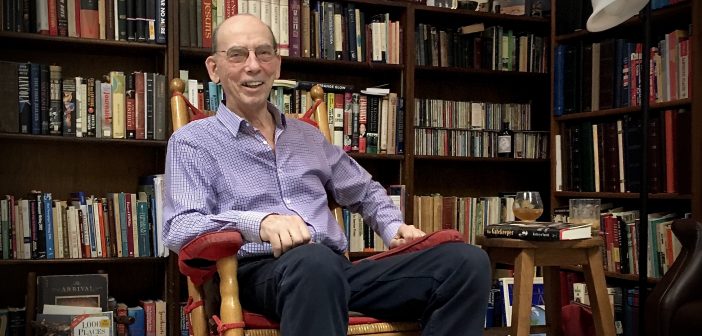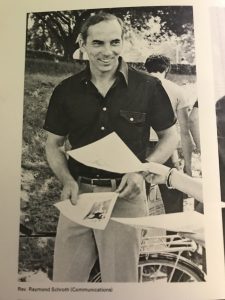“Father Schroth—Ray, as many of us knew him—was a towering figure at Fordham: he was a beloved professor, a treasured colleague, a lucid journalist and writer, and an insightful historian of the University and the Jesuits,” said Joseph M. McShane, S.J., president of Fordham. “He was wise, compassionate, and rigorous, and held his colleagues and students to his own very high standards. We will miss him greatly, and we will keep him and his loved ones in our prayers.”
Father Schroth received a bachelor’s degree from Fordham College at Rose Hill in 1955. In 1969, he returned to his alma mater as an associate professor who taught journalism in the communications department. During that time, he became the first person in University history to be granted tenure by the Faculty Senate, after initially being denied tenure by his department. The tense battle was covered by The New York Times, which referred to him as “probably the most popular teacher on campus.” He did earn tenure, thanks to a majority vote, student support, and the intervention of James C. Finlay, S.J., president of Fordham at the time.
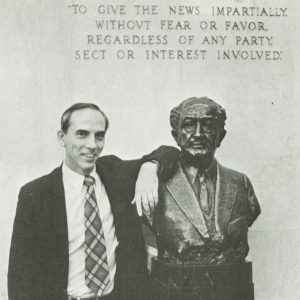
Father Schroth beside a bust of publisher Adolph S. Ochs at a Fordham tour of the New York Times in 1976. Photo by Gail Lynch-Bailey
“Many of us on the Faculty Senate at the time, including myself, felt that a rejection by his tenured faculty in his department was not an appropriate decision. He was known by us to be a good teacher and a popular teacher,” recalled Robert Himmelberg, Ph.D., professor emeritus of history.
For decades, Father Schroth taught American literature and journalism and/or served as academic dean at at least six universities. In 1979, Father Schroth left Fordham to become academic dean at Rockhurst University (formerly known as Rockhurst College) in Kansas City, Missouri. But almost two decades later, he returned to Fordham, where he served as assistant dean of Fordham College at Rose Hill from 1996 to 1999.
In August 2016, he moved to Murray-Weigel Hall for health reasons. After experiencing a bad fall in 2017, he was confined to a wheelchair and “accepted reluctantly, but with faith, his disabilities,” read his obituary from the Jesuits USA Northeast Province.
“I think of the different seasons of Ray’s life on that campus, from a young man in the ’50s to a young priest just beginning his work in the late ’60s, to this robust and storied presence in the ’90s. And now, in his last couple of years, a man who really suffered under the weight of age and infirmity,” said journalist Eileen Markey, FCRH ’98, past student and friend of Father Schroth’s who has served as an adjunct professor at Fordham. “All of those seasons on this campus really defined his life.”
‘At Heart Ray Is a Reporter’
Raymond Augustine Schroth was born in Trenton, New Jersey, on November 8, 1933, to Raymond Schroth, a journalist and U.S. Army veteran who was awarded the Distinguished Service Cross in World War I, and Mildred (née Murphy) Schroth, a teacher in the Trenton public and Catholic schools.
“Somehow I had made the basic decision inspired by both my parents’ lives: I wanted to write and teach, and that’s what Jesuits do,” he wrote in a 2007 story for the NJVoices column that reflected on his life.
Father Schroth served for two years as an officer in the U.S. Army with an anti-aircraft battalion in West Germany, where he found his two vocations: the priesthood and journalism. In 1957, he joined the Society of Jesus and was ordained as a priest a decade later. He went on to earn two degrees in addition to his Fordham degree: a bachelor of sacred theology degree from Woodstock College, Maryland, in 1968, and a Ph.D. in American thought and culture from George Washington University in 1971.
Journalism ran in his blood. His father served as an editorial writer for the Trenton Times, Brooklyn Eagle, and Philadelphia Record. His uncle, Frank D. Schroth, was the last publisher of The Brooklyn Eagle, according to a 1977 obit from The New York Times.
For most of his life, Father Schroth followed in his family’s footsteps. He reported from 14 countries, including Syria and Russia, according to America magazine. In the U.S., he covered the aftermath of the Detroit riots and the 1968 Democratic National Convention, among other historic events.
Throughout his lifetime, Father Schroth authored eight books, including Fordham: A History and Memoir (Fordham University Press, 2008), a 300-page document that chronicles 137 years of the institution’s history. Other titles include The American Jesuits: A History (NYU Press, 2007) and Bob Drinan: The Controversial Life of the First Catholic Priest Elected to Congress (Fordham University Press, 2010). He published more than 300 articles and reviews that have appeared in multiple publications, including the Los Angeles Times, The Boston Globe, the National Catholic Reporter, Commonweal, and Newsday. In 2010, he joined the editorial staff of America, where he served as literary and books editor until he retired in 2017 and received the title editor emeritus.
“At heart Ray is a reporter. … [H]e has never forgotten that an important part of a reporter’s job—especially for a Catholic journalist—is to tell the stories of ordinary people, the folks in the pews or on the streets,” Matt Malone, S.J., editor in chief of America: The Jesuit Review and president of America Media, wrote in a 2017 story.
In that piece, Father Malone quoted something Father Schroth wrote on teaching: “The first step in teaching moral values to young journalists is to get them to feel pain—not their pain, the pain of others. From that, other virtues—compassion, skepticism, courage and the like—might follow.”
Mentor to Students ‘From All Eras’
Father Schroth loved to tell stories. That was clear in the ’70s, if you entered his room and studied the walls, and even two years ago, in his room at Murray-Weigel Hall.
“You could come into his living room and see posters about strikes or political events that were going on, or you could see these very of-the-moment nonfiction books,” recalled Jim Dwyer, FCRH ’79, a two-time Pulitzer Prize-winning journalist who writes for The New York Times. “For an 18- or 19-year-old, it was a portal from the protected world of the campus to the wider world beyond.” He shared that passion with his students, too.
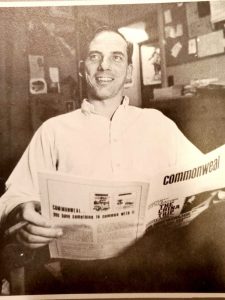
Father Schroth in his room at Martyrs’ Court, where he lived as both a student and a professor, pictured in the 1972 Maroon yearbook. Photo courtesy of Gail Lynch-Bailey
“There’s this fraternity of Ray’s students from all eras, people ranging from their mid-sixties down to those of us in our forties or thirties, and people at all kinds of publications all over the country,” said Markey.
Father Schroth urged students to fact-check official statements from powerful figures, past students recalled. He was a writer who despised the phrase “the fact that” and emphasized the importance of writing concisely. He taught young journalists to set high standards for themselves and their work, and he stressed the importance of using their stories as “a force for change,” said another alumna.
“In the early ’70s, the thinking in journalism was that a reporter had to report both sides of the story and be this impartial person … He understood that view, but he also presented the view that journalism was a force for change and a voice for the underdog and the underprivileged,” said Loretta Tofani, FCRH ’75, a retired investigative journalist.
Father Schroth introduced Tofani to the work of several investigative journalists who played a role in her Pulitzer Prize-winning exposé of prison rape for The Washington Post, she said.
Exposing students to important works and history was a priority for Father Schroth. He convinced his colleagues to come up with an annotated list of the most significant 10 books they had read, which he shared with his students as a guide to life, said Roger Wines, Ph.D., professor emeritus of history. He spearheaded the “Great Walk,” an annual student trek between the Battery in Manhattan and the Rose Hill campus—a way to explore the city and show students parts of New York that they might not otherwise see, said past students. Father Schroth also refused to become a “stale” professor.
Dwyer recalled one summer when he returned to campus and found Father Schroth in his room in Martyrs’ Court, shredding sheets of handwritten looseleaf notes.
“I’m tearing up my notes for the books I’m teaching this semester,” Father Schroth explained.
“Why on Earth would you do that if you’re going to be teaching them in a couple weeks?” Dwyer asked.
“To force myself to read the books anew, so I don’t become stale,” Father Schroth replied.
Connecting Students ‘to a Wider World’
In phone interviews, past students and colleagues described “Ray” as a stellar journalist and stalwart friend. He occasionally clashed with students, faculty, and his more conservative Jesuit brethren, but stood up for what he thought was right and inspired scores of students to do the same, they said.
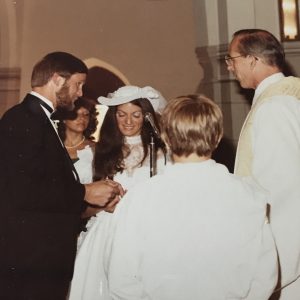
Father Schroth presiding over the nuptial mass for Loretta Tofani and John E. White at the Annunciation Church in Crestwood, New York, on September 8, 1983. Photo courtesy of Loretta Tofani
“One of the things that was really singular about Ray is his combination of intense rigor, high expectations, and personal standards, mixed with a tremendous sweetness and warmth,” said Markey. “Sometimes we think of those as two different things … But Ray did both.”
Father Schroth was a tall, lean man who stood so straight that it made you want to stand up straighter, said Markey. He was also an avid runner, bicyclist, and swimmer. At age 83, he walked for miles along the Camino de Santiago, a pilgrimage trail in Spain, as he recounted three years ago. He loved show tunes, especially songs sung by Nelson Eddy and Jeanette MacDonald, and persuaded his fellow pilgrims to sing with him as they trekked the Spanish countryside, said Dwyer. He also took his friendships very seriously.
“On Holy Thursday every year, he would send an email to many of us, saying, ‘This is when Jesus gathered his friends together and said, do this in memory of me, and this is a ritual of friendship and community, and that’s what we are to each other.’” said Markey.
Over the years, he created a box filled with index cards that listed the names of hundreds of friends and family members. Every time there was a birth, move, divorce, job change, or marriage, Father Schroth updated the cards.
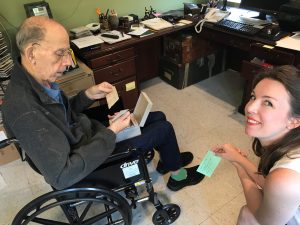
Father Schroth shows his box of index cards to WNYC reporter Jim O’Grady, FCRH ’82, and his wife, Clara, in Murray-Weigel Hall in 2019. Photo courtesy of Jim O’Grady
“He married students. He buried their parents and baptized their children. And he did all that for me,” said Dwyer. “But he did that for hundreds of people.”
“He connected me to the world of journalism, which has been my life for the last 40 years,” Dwyer continued. “But the bigger thing that Ray did for me and thousands of others is connect us to a wider world. He taught us that friendship has to be looked after—that it has to be cultivated and nurtured.”
Due to the COVID-19 pandemic, the wake and funeral Mass for Father Schroth at Murray-Weigel Hall will be private. He will also have a private burial at the Jesuit Cemetery in Auriesville, New York. His family will have a public memorial Mass when it is possible. Notes of condolence may be sent to his nephew, Kevin Schroth, at 79 Bingham Avenue, Rumson, NJ 07760.
